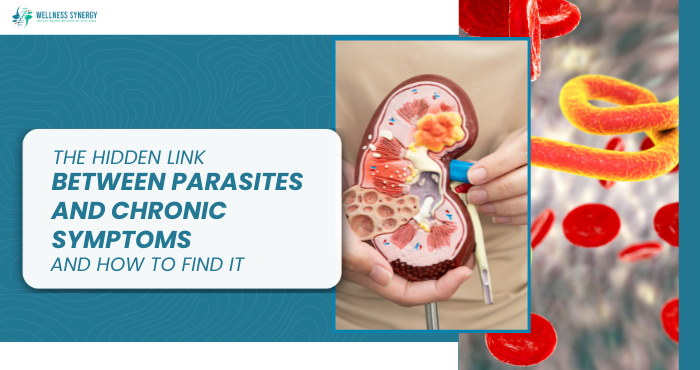The Hidden Link Between Parasites and Chronic Symptoms And How to Find It
When clients struggle with ongoing issues like bloating, fatigue, or skin problems, parasites may not be the first thing that comes to mind. Most people don’t even think they could have parasites, especially if they’ve never traveled overseas or have been told by a doctor that their lab work is “normal.”
But here’s the truth: parasites are far more common than most realize, and they often fly under the radar of traditional testing methods. That’s where bioenergetic testing can offer a valuable perspective.
Let’s explore how parasites affect health, why they’re often missed, and how bioenergetic testing can help bring clarity and direction to your practice.
Understanding Parasites
The word “parasite” might sound like something out of a biology textbook, but in reality, parasites are organisms that live in or on a host and feed off it, often at the host’s expense. Some are microscopic, like protozoa, while others, such as worms, are visible to the naked eye.
They can appear in areas such as the gut, liver, lungs, and even the skin. Although not all parasites are dangerous, many can disrupt digestion, deplete nutrients, irritate the immune system, and trigger inflammation.
Some of the most common symptoms that may be linked to parasitic infections include:
- Digestive issues (bloating, diarrhea, constipation)
- Chronic fatigue
- Brain fog
- Skin rashes or itching
- Sleep disturbances
- Joint or muscle pain
- Nutrient deficiencies
- Unexplained weight changes
Sound familiar? That’s because many of these signs overlap with other chronic conditions, making parasites hard to spot without deeper investigation.
The Limits of Conventional Testing
Stool tests and blood panels are the go-to tools in most conventional settings. The problem is, these tests have limitations:
- Stool samples may miss parasites if they are not shedding eggs or if the sample timing does not align with their life cycle.
- Blood tests depend on the body producing a strong enough immune response to register parasite-related antibodies or antigens. That doesn’t always happen, especially in people with weakened or overburdened immune systems.
So, even if symptoms are present, lab results often come back as normal. That leaves clients feeling confused, frustrated, and sometimes even dismissed.
The Bioenergetic Approach
This is where bioenergetic testing steps in. Instead of looking for the physical presence of a parasite, this method measures how the body’s energetic systems respond to stressors, including those caused by parasites.
Every cell, tissue, and organ has its energetic frequency. Parasites, like everything else in nature, carry their unique energetic signatures. By testing how the body reacts to these frequencies, practitioners can determine whether a parasite is contributing to the client’s symptoms without the need for invasive or inconclusive tests.
Importantly, bioenergetic testing doesn’t diagnose diseases. Instead, it provides insight into where the body is under stress and what it may be ready to address.
Why Parasites Are Often Overlooked
Parasites don’t always cause loud, apparent symptoms. Instead, they tend to chip away at the body over time. Many clients might notice things like sugar cravings, persistent gas, or cycles of fatigue, but never connect these issues to parasites.
And while parasites can affect anyone, they thrive especially well in bodies that are already under stress. For example:
- Weakened immune function
- Compromised digestion
- Heavy metal exposure
- Poor detox pathways
- Imbalanced gut bacteria
In these cases, parasites often coexist with other underlying issues, meaning they may not be the only problem, but they are usually part of the picture.
The Value of Bioresonance in Practice
For practitioners, adding bioenergetic testing to your toolbox opens up new possibilities. It helps:
- Identify energetic imbalances that may suggest parasitic activity
- Tailor protocols to your client’s current state, without guesswork
- Uncover related concerns like food sensitivities or nutrient deficiencies
- Support gentle detoxification strategies, particularly for sensitive clients
For example, if testing reveals imbalances in areas such as the digestive system, immune system, or nervous system, this can signal that parasites, along with other factors, are playing a role.
Parasites and Nutrient Imbalances
Parasites often interfere with nutrient absorption and can even feed off the nutrients your client needs to thrive. Over time, this can lead to:
- Low iron or anemia
- Zinc and copper imbalances
- Fatty acid deficiencies
- Digestive enzyme insufficiency
Energetic testing may reveal these nutrient gaps, which can then be addressed through targeted supplementation, herbal support, or food-based strategies, depending on what’s best for the client.
Gut Health, Food Reactions, and Parasites
Parasites can also damage the gut lining, leading to increased food sensitivities. If clients are reacting to foods like gluten or dairy, even when those foods were never a problem before, it could be a clue that something deeper is going on.
For instance:
- Damage to the gut wall can reduce enzyme production, leading to symptoms such as bloating after meals.
- Infections like Giardia have been linked to temporary or even long-term gluten sensitivity.
- Parasite activity may irritate the gut lining and immune system, making the body react to otherwise harmless foods.
Instead of relying on restrictive diets that may not be sustainable, energetic testing helps pinpoint why certain foods are a problem and how to support the body in healing.
Creating a Healthier Internal Environment
Parasites tend to thrive in environments that are already off balance. A sluggish liver, a clogged lymph system, or toxic overload can make the body more hospitable to invaders.
Using herbs, homeopathy, or nutrition to support the body’s natural detox pathways can help restore balance. When guided by bioenergetic feedback, these approaches become more personalized and often more effective.
Final Thoughts
Parasites are a hidden piece of the puzzle in many chronic wellness struggles. While they might not always be the root cause, they often contribute to symptoms that persist.
Traditional testing methods can miss them, leaving clients often feeling discouraged. Bioresonance testing provides a way to look beneath the surface, understand where the body is under stress, and offer support that aligns with what the body is ready to handle.
By using bioenergetic insights, practitioners can create more targeted and compassionate care plans, helping clients move forward on their healing journey with greater clarity and confidence.
FAQ for Bioenergetic Testing for Parasites
How does bioenergetic testing work?
Bioenergetic testing uses subtle electrical signals to interact with the body’s energy and detect stress patterns or imbalances.
Can parasites be detected without stool tests?
Yes, bioenergetic testing can reveal energetic signs of parasites even when conventional stool tests miss them.
What symptoms might suggest a parasite issue?
Common signs include bloating, fatigue, skin problems, food sensitivities, and brain fog.
Is bioenergetic testing safe for sensitive clients?
Yes, it’s non-invasive, gentle, and ideal for those who can’t tolerate traditional testing or detox methods.
Why is bioenergetics important in health practices?
It helps uncover hidden stressors, like parasites, by assessing the body’s energy field offering a personalized path to healing.


